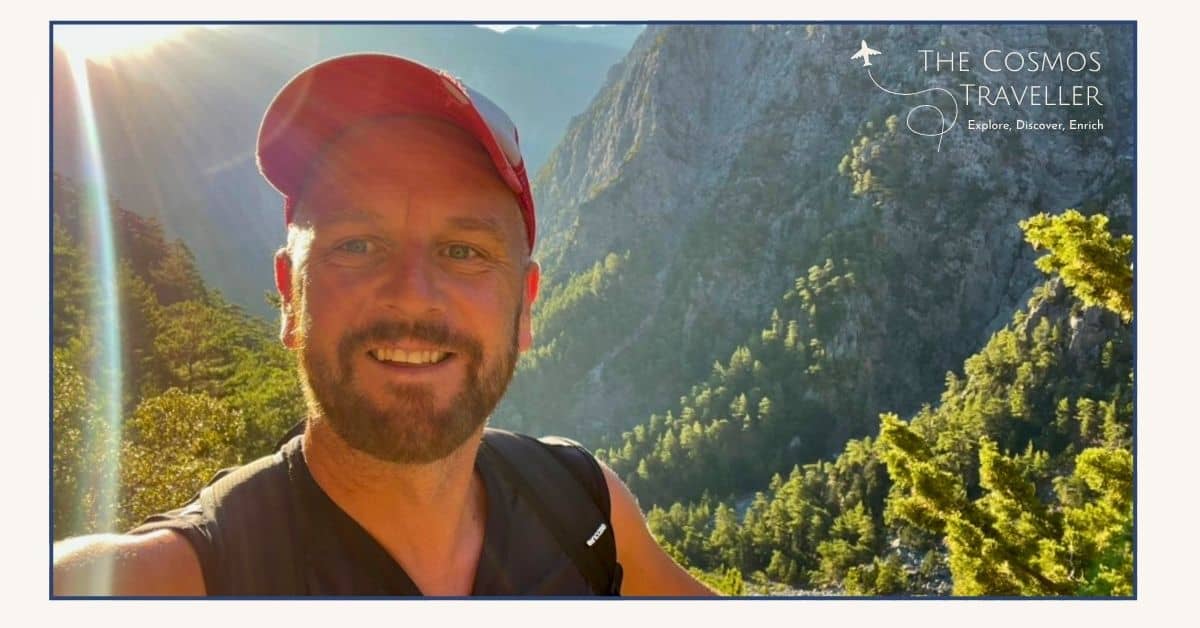
Is Hiking Samaria Gorge Worth It? 3 Hikes Later
I first conquered the Samaria Gorge descent in southern Crete in 1988 as an 11-year-old boy, when the trail was far less well-known and people attempted the walk in flip-flops. It was a memorable experience, and I had vague recollections of spectacular vistas, mountain goats, and a boat ride across the bluest waters imaginable.
Returning again in 2022 and just last week (June 2025), I was not disappointed. While the trail is now somewhat busier and hikers are far better equipped, the scenery remains awe-inspiring, the immersion in nature is total, and that final boat ride is still among the most mesmerising I’ve ever taken.
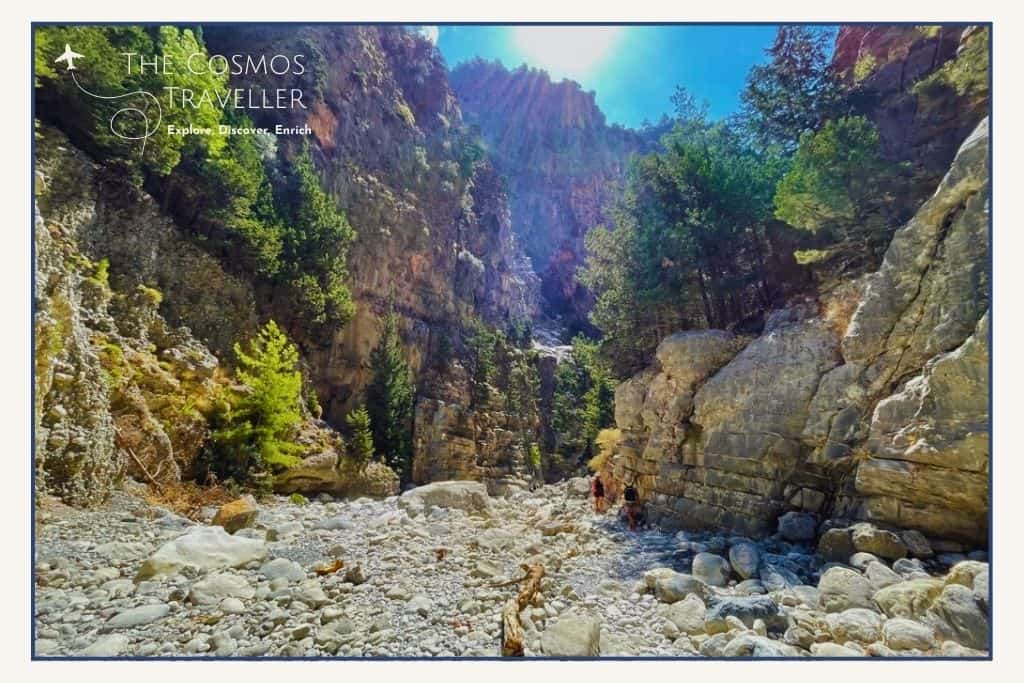
So — is hiking the Samaria Gorge worth it? After experiencing it across four decades and in all kinds of ways — by bus, private taxi, and self-drive — I’ll share everything you need to know to decide for yourself. Read on to plan in detail, dodge common mistakes, and uncover what makes this iconic Cretan adventure truly unforgettable.
Quick Facts – Hiking the Samaria Gorge 2025
📍 Distance: 16km (10 miles) one-way
⏱️ Duration: 5-7 hours
📉 Elevation Drop: 1,250m to sea level
🥾 Difficulty: Moderate to challenging – not technical, but long and rocky
🎟️ Entrance Fee: €10 cash or card
⛴️ Ferry Required: Yes – now bookable online or at the port
⚠️ Keep hold of your ticket, you will be required to show it when exiting the gorge at the bottom.
How Has the Samaria Gorge Changed Over Time?
The Samaria Gorge has transformed from a wild, self-guided adventure in the 1980s into a structured, safer experience in 2025. While modern improvements like online ferry ticket booking and guardrails enhance accessibility and safety, the hike still retains its raw natural beauty — just with fewer goats and more hikers.
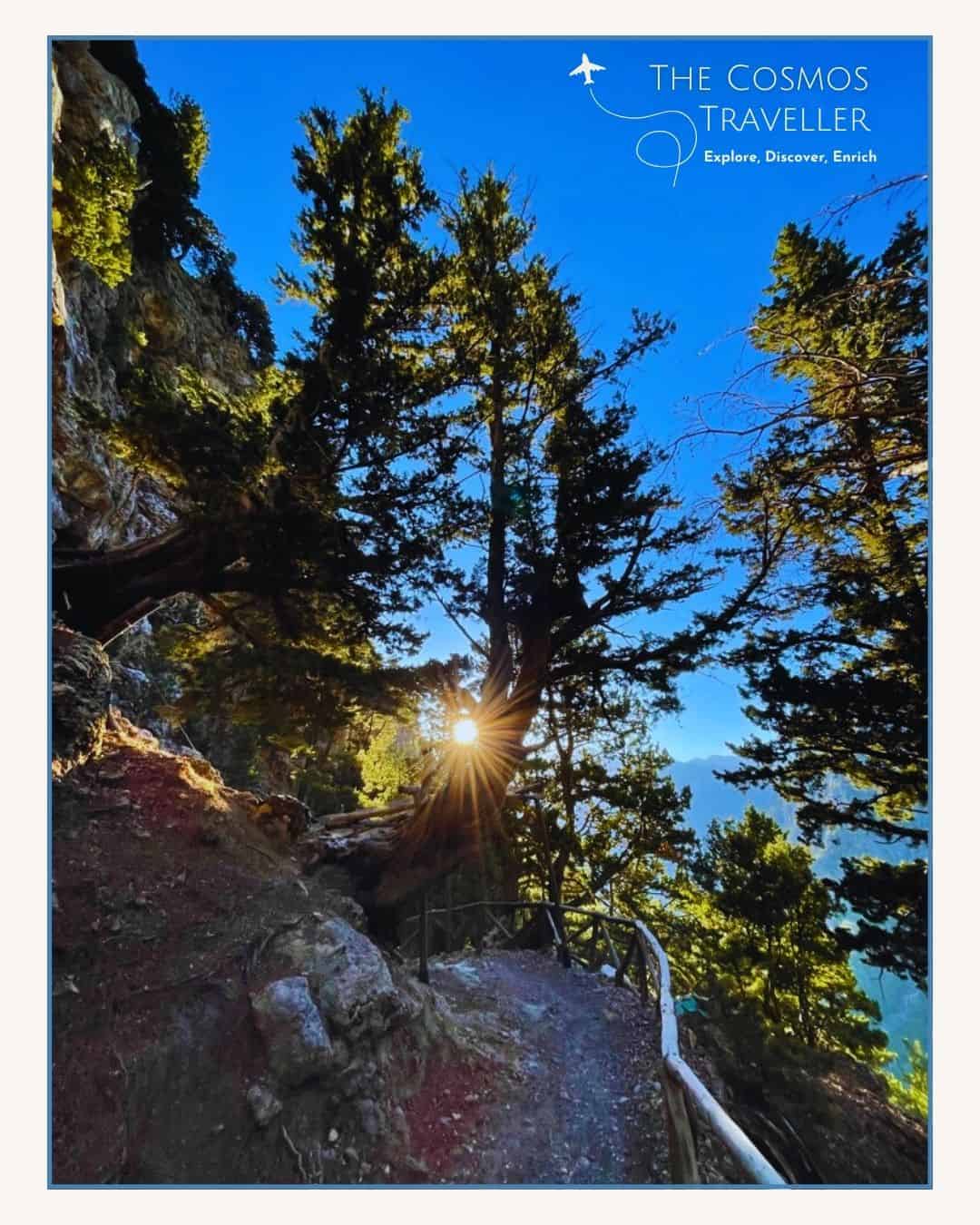
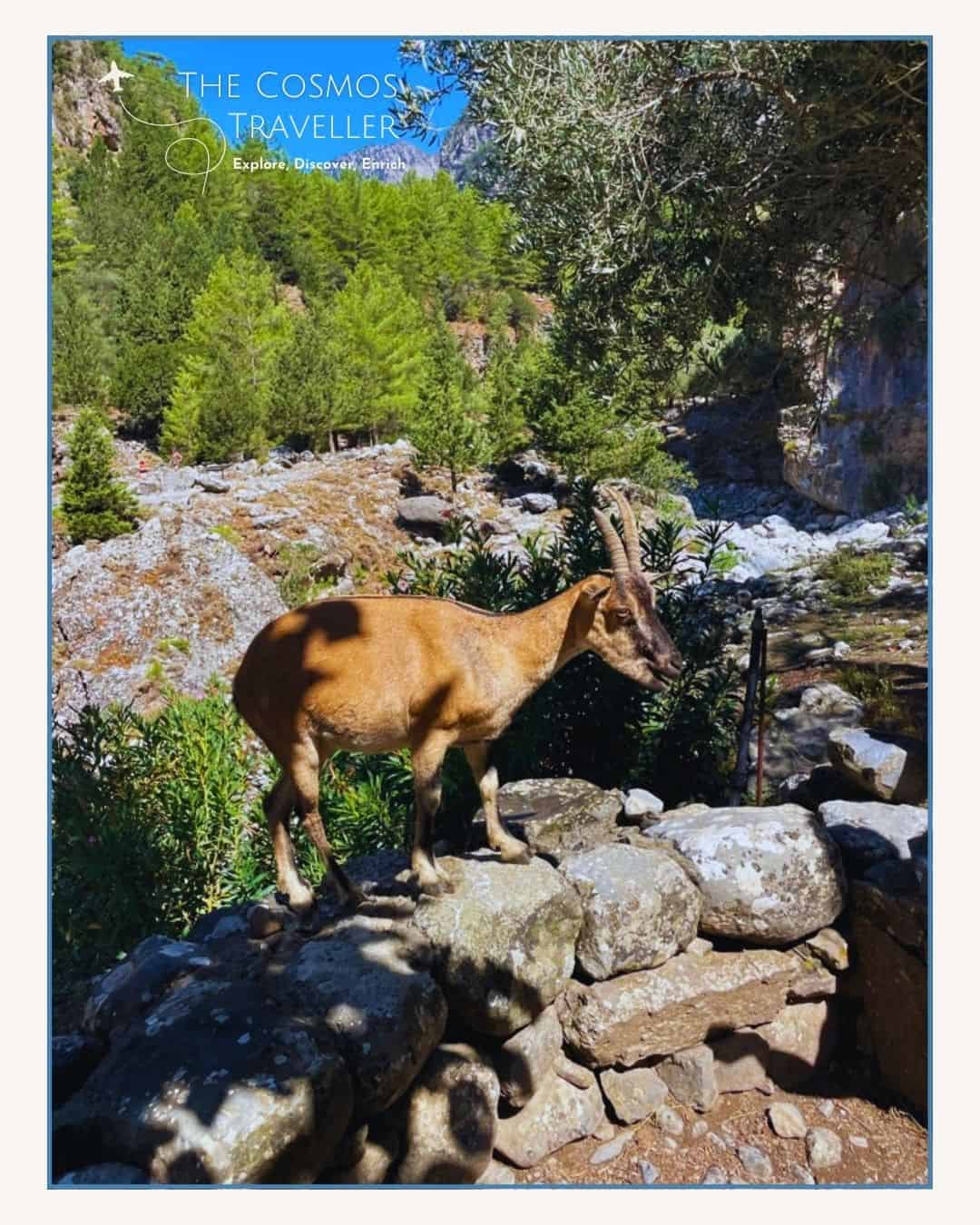
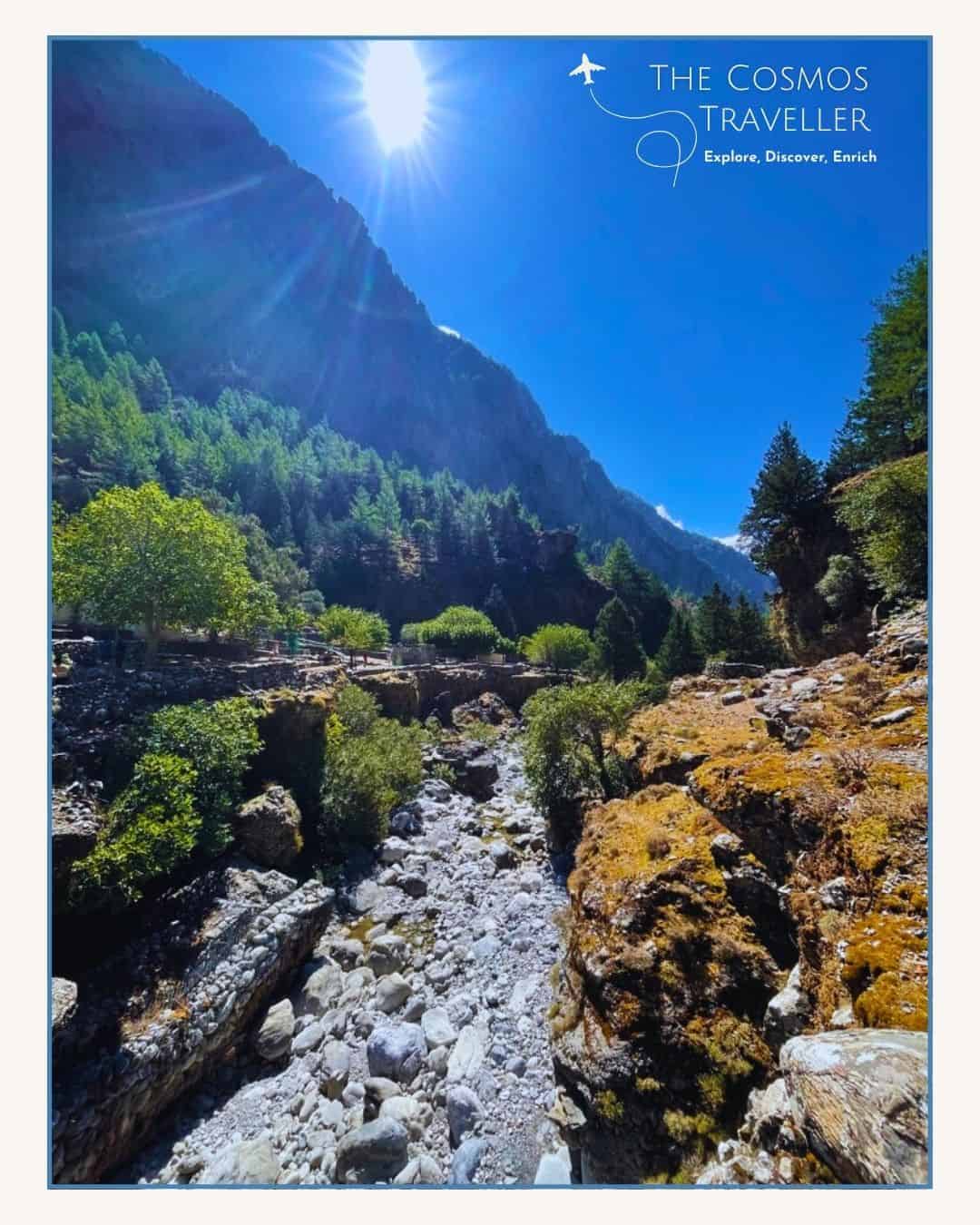
Samaria Gorge: Wild Past vs Welcoming Present
1988 (The Wild Years)
Tourism in Crete was still relatively low-key back then — especially on my very first visit in 1981. I feel incredibly lucky to have hiked the Samaria Gorge in its more untamed era.
- 🥾 No marked trail – we explored freely, following goat bells and our instincts
- 🧊 Fridges by the trail – near the end, fridges lined the last few hundred metres; you helped yourself and paid further down. A beautifully simple system
- 🚫 Few safety rails – just common sense and steady feet
- 🐐 Kri-Kri sightings – wild goats were abundant and visible throughout the gorge
2022 & 2025 (The Organized Experience)
What to expect hiking the Samaria Gorge today: more structure, safety protocols and modern conveniences — making it more accessible to travellers of all levels.
- 🎟️ Online ferry bookings – even more streamlined now than in 2022
- ✅ Check-in and check-out system – hikers are accounted for from start to finish
- 🛑 Guardrails along steep descents – necessary after years of accidents
- 🍽️ Agia Roumeli now has dozens of tavernas – in 1988, there were just two
- 🔍 Kri-Kri goats are harder to spot – you’ll need patience and luck to find them today
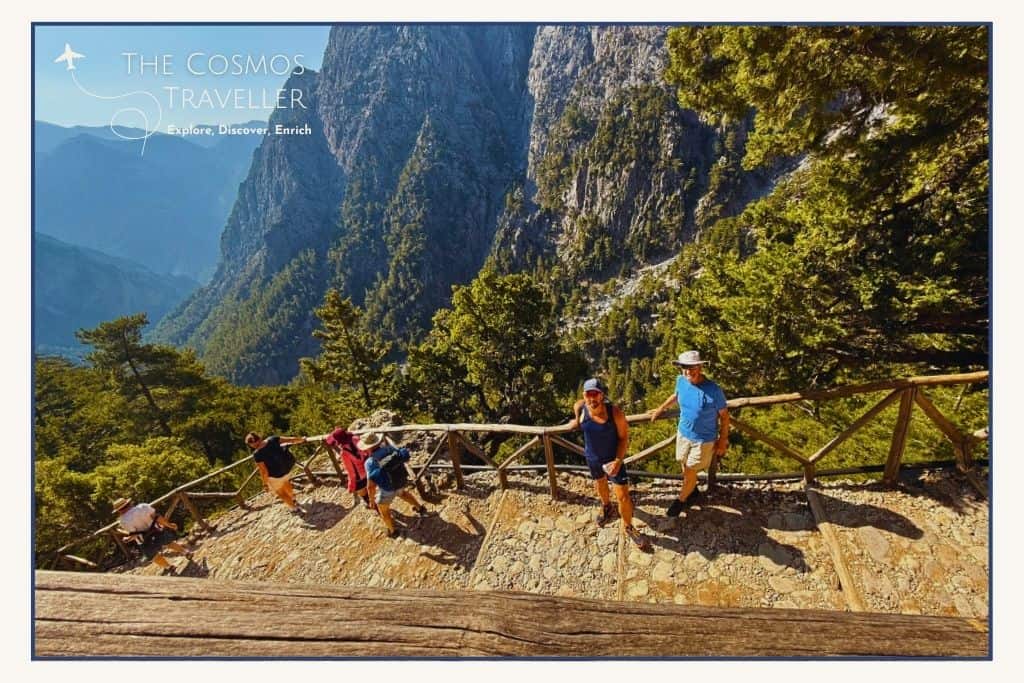
How to Hike The Samaria Gorge in 2025
There are three main ways to hike the Samaria Gorge — and I’ve personally tried all of them over the past few decades. Whatever you choose, set aside a full day with an early start and late finish.
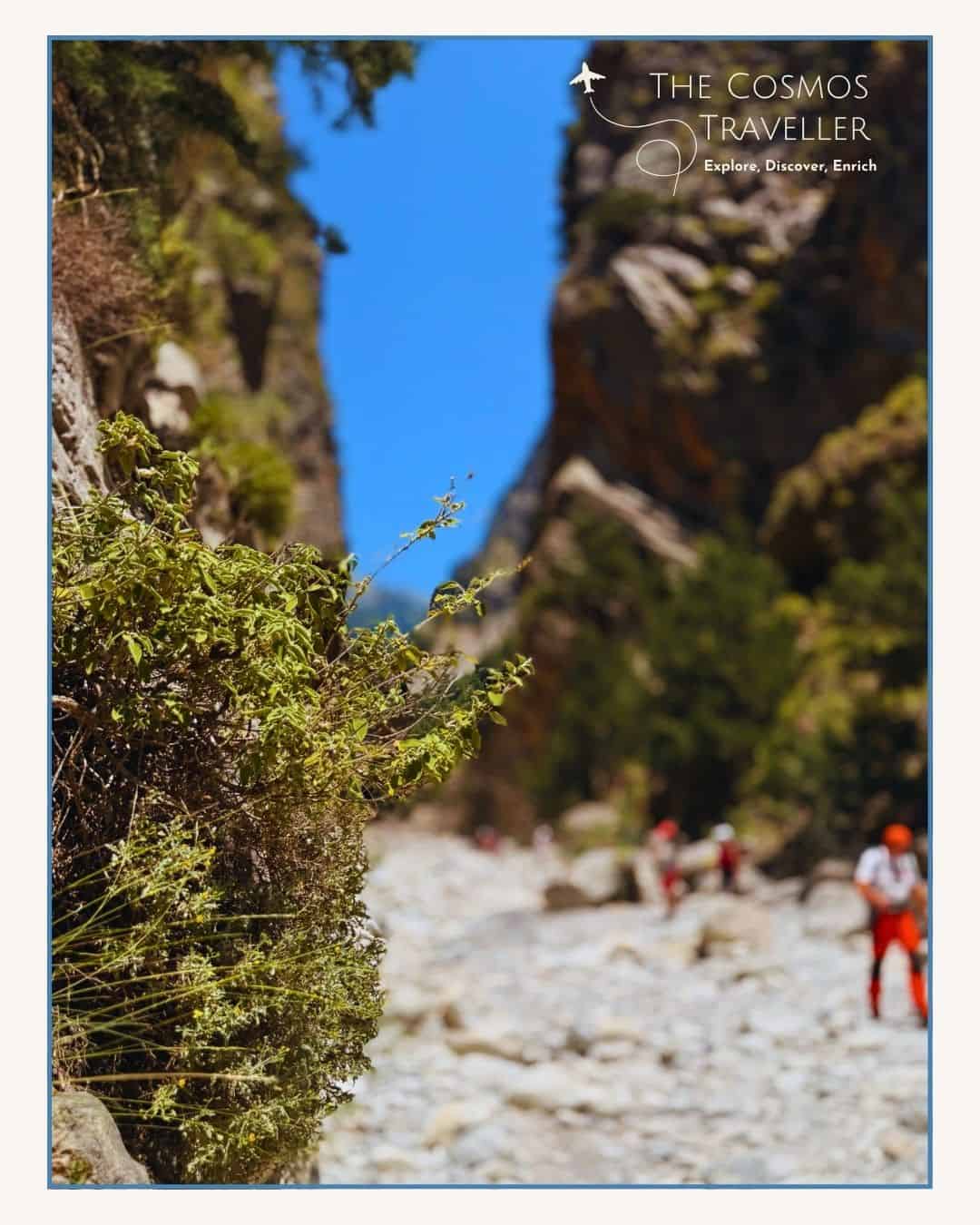
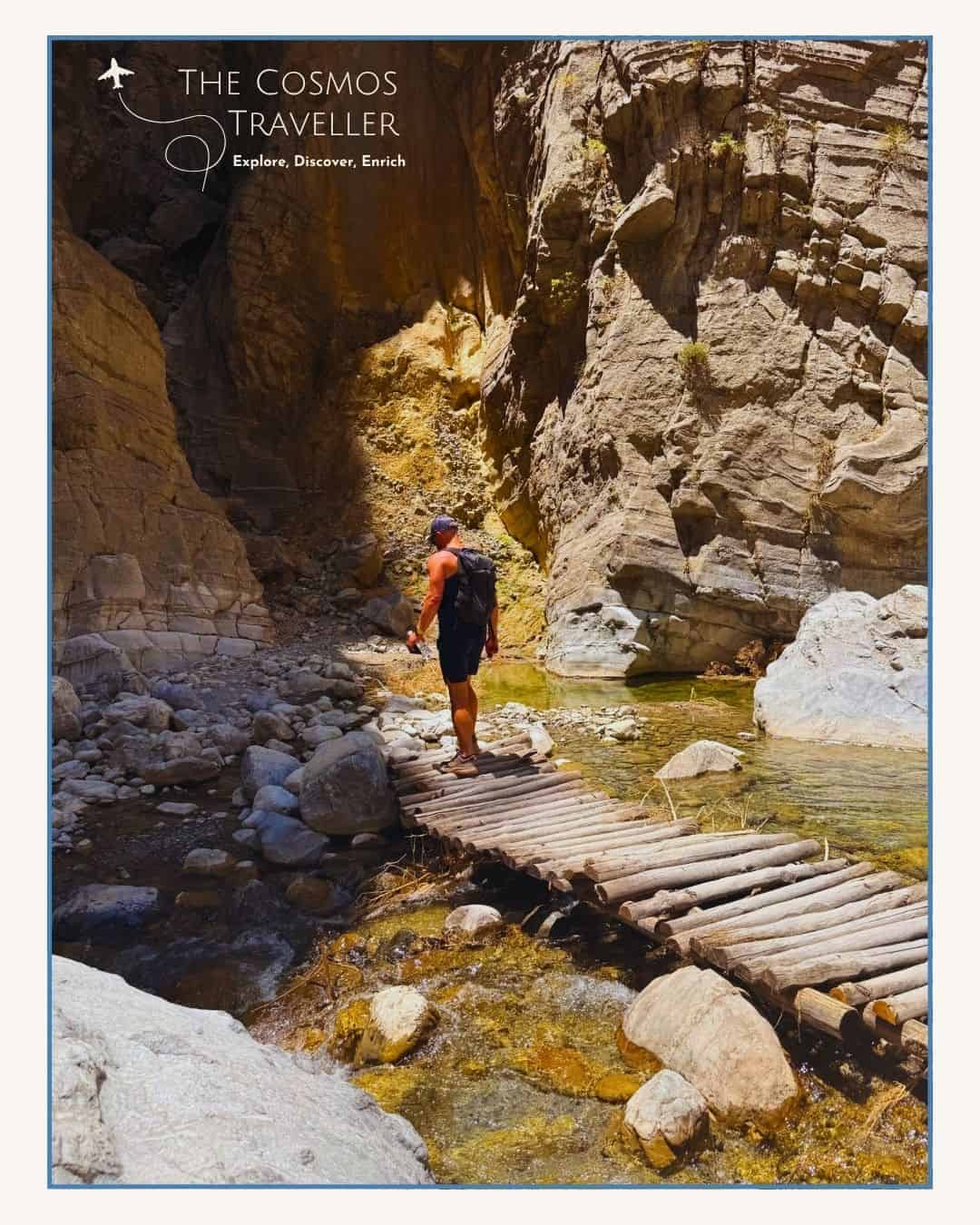
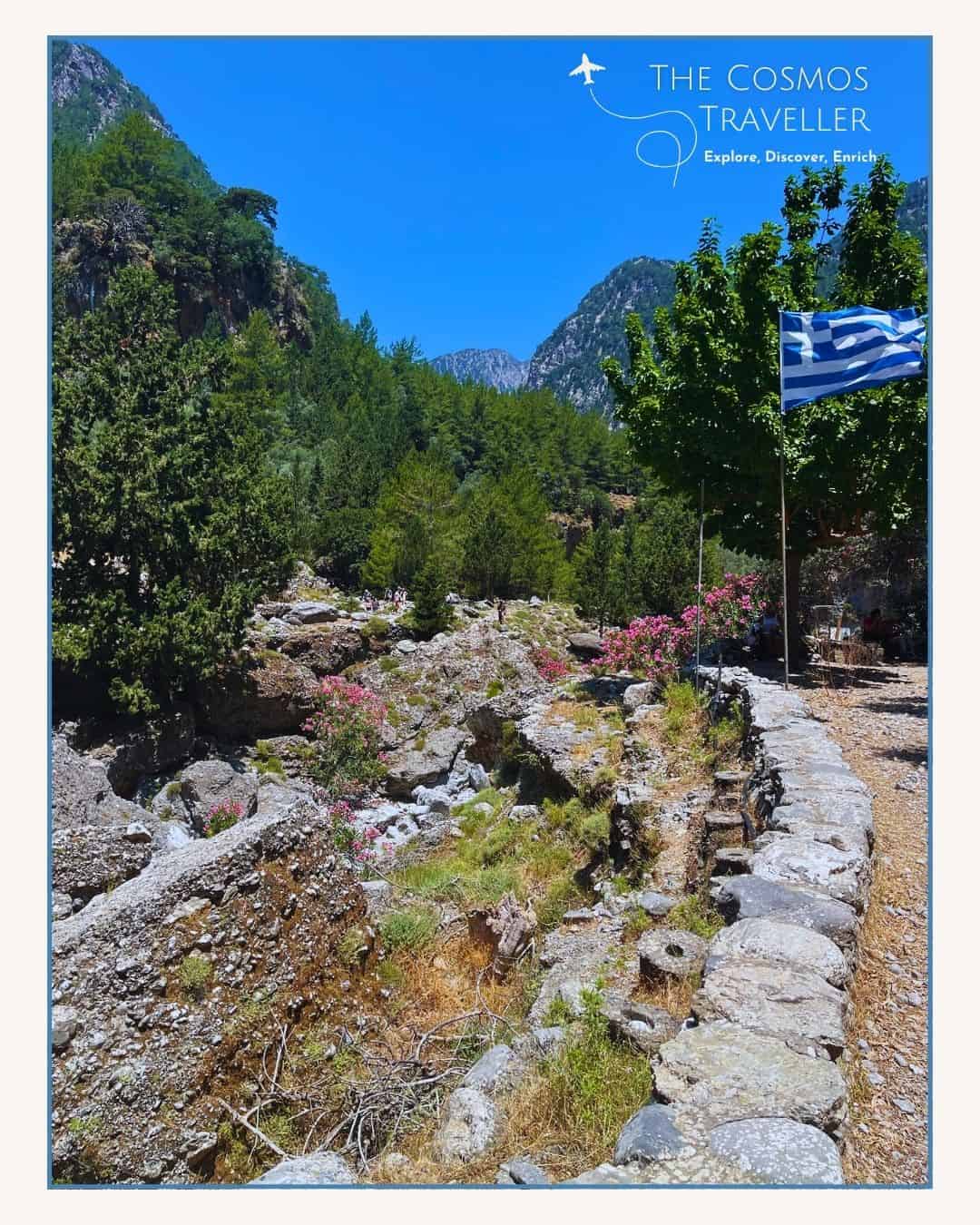
⚠️ Agia Roumeli is not accessible by car or coach so planning and logistics matter. You will have to take the ferry from Agia Roumeli to either Sougia or Chora Sfakia for your onward travel.
🚌Option 1: Organized Tour (Northern Crete Resorts)
Best for: Convenience from Chania, Rethymno, Heraklion
Approximate Cost ~€40 – €70 – (including transfers and entry)
✅ Most Popular Way to Hike the Gorge
If you’re staying on the north coast, this is the simplest and most convenient option — no car or planning needed!
🌟 Recommended Tours:
📍 From Chania – Book this budget-friendly self-guided tour with smooth logistics included.
📍 From Rethymno – Go with this top-rated 5⭐️ experience loved by hundreds of hikers.
📍 From Heraklion – Choose this well-reviewed full-day tour for stress-free transport and entry.
👉 Click your location and secure your spot early — these fill fast during peak season!
- Early morning pick-up from your hotel
- Coach to Omalos (~1–1.5 hours)
- Self-guided hike through the gorge
- Meet the same coach after the ferry in Sougia or Chora Sfakia for your return
- ⚠️ Ferry ticket may or may not be included — always check in advance and know whether you need to meet the coach in Sougia or Chora Sfakia.
💡 Top Tip: If you get motion sickness, take something before the winding drive to Omalos — it’s steep and curvy.
🚕 Option 2: Taxi (€50-€80)
Best for: Early starts, flexibility, avoiding coach crowds
Approximate Cost ~€50 – €80 – (each way)
My favourite option in recent years. In both 2022 and 2025, I based myself in Sougia for 2 nights — one before the hike and one after. This meant no early alarms, no coach stress, a peaceful pace and one taxi transfer only to Omalos.
- Book in advance with Antonia at Sougia Taxi Meletis on WhatsApp – they’re friendly, reliable, and offer great local advice (all booking can be done via What’sApp and costs €50 one way)
- Travel to the top of the gorge (Xyloskalo) early to beat the tour groups
- Hike at your own pace and take the ferry back to Sougia
- No rush, no crowds — just nature
💡 Top Tip: Sougia makes a fantastic base — peaceful, scenic, and a hidden gem in its own right.
🛏️ Where to Stay: I really recommend this charming Sougia accommodation — it’s quiet, convenient, very reasonably priced and the perfect location on the beach after a long hike.
🚗 Option 3: Self-Drive
Best for: Independent travellers with flexible timing
Watch out for: Return logistics
Yes, you can drive to the top of the gorge yourself — but there’s one big issue: you won’t finish where you start.
- Arrive early — parking at Omalos fills by 6:30am in summer
- Hike the gorge and take the ferry to Sougia or Chora Sfakia
- Then you’ll need to get back to your car, either by bus, taxi, or ferry depending on the day’s schedule
- This option requires a bit of planning and possibly overnighting nearby
💡 Top Tip: Stay in Sougia and pre-arrange your taxi with Sougia Taxi Meletis. It simplifies the whole day — especially if you’re up for a post-hike swim and sunset.
🛏️ Need a place to stay? This is the Sougia stay I keep going back to — clean, comfortable, and super close to everything.
⚠️ Where Does the Samaria Gorge Hike Actually Start?
Before we break down the trail section by section, let’s clear up a common point of confusion about where the hike actually begins.
You’ll often see the hike listed in other websites of tours as starting from Omalos or from Xyloskalo — and this can be a bit confusing.
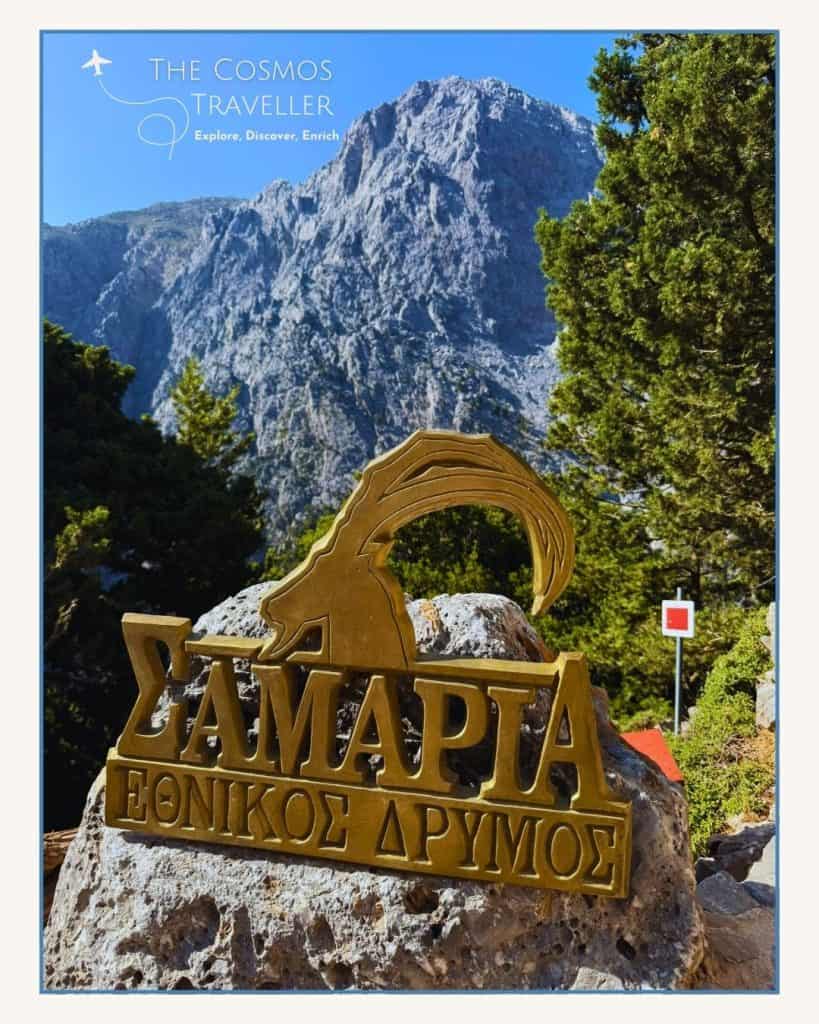
In reality, Xyloskalo is the name of the gorge’s entrance, located at the southern edge of the Omalos Plateau.
It’s where the road ends and the trail begins — at an altitude of 1,230 metres — and it’s the drop-off point for taxis and tours.
So if you hear “Omalos” or “Xyloskalo,” they’re referring to the same starting point.
You can find more information at the official site of the Samaria Gorge.
Samaria Gorge Hike Stage-by-Stage: What Your Feet Will Feel
The Samaria Gorge hike can be divided into four distinct sections, each roughly equal in length. The terrain and scenery shift dramatically throughout, offering a varied hiking experience. Here’s what to expect in each section, including key waypoints, elevation changes, and practical tips.
📍 Stage 1: Xyloskalo to Agios Nikolaos (aka The Knee Crusher)
Your Samaria Gorge adventure begins at Xyloskalo, the northern entrance to the gorge in Crete’s White Mountains (Lefka Ori). The name Xyloskalo means “wooden staircase” in Greek—a fitting name for the steep, stepped path that kicks off the descent.
🗺️ Distance: ~4 km
📉 Elevation loss: ~580 meters
💧 Water Stations: 2
This section is steep, rocky, and hard on the knees—hence my nickname: The Knee Crusher. Most accidents happen here, especially early in the day when the rocks are still slick from dew. Years of foot traffic have polished the stones smooth, so take your time and watch your footing.
💡 Top Tip: If you need extra support, bring trekking poles and wear grippy hiking shoes. You’ll thank yourself later.
It’s easy to get so focused on the uneven ground that you forget to look up—but don’t miss the views. The cliffs and pine-covered slopes are breathtaking, especially in the morning light.
🏞️ Scenic Highlight: About 20–30 minutes in, you’ll find a natural spring—a great spot to refill your bottle with fresh, icy mountain water.
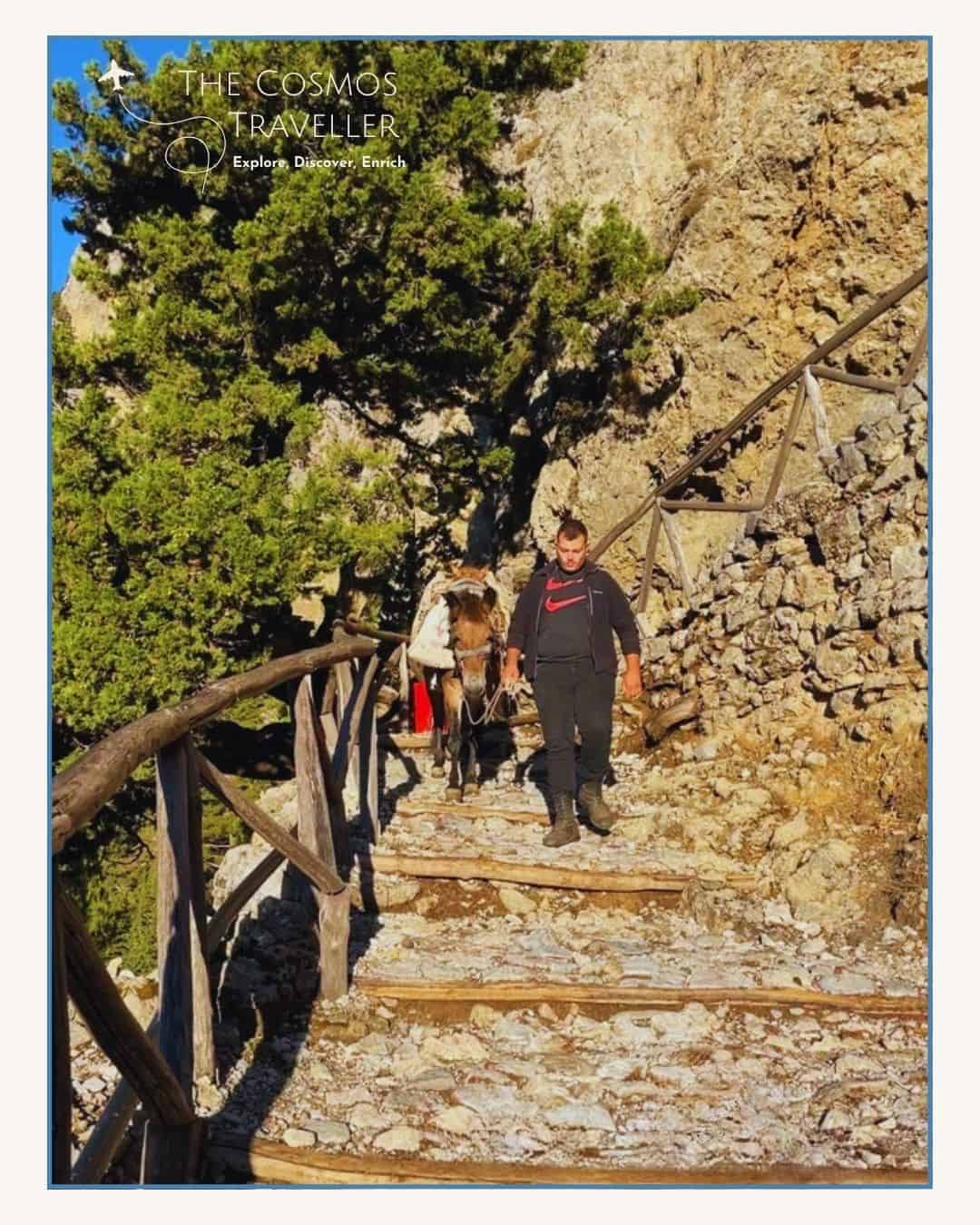
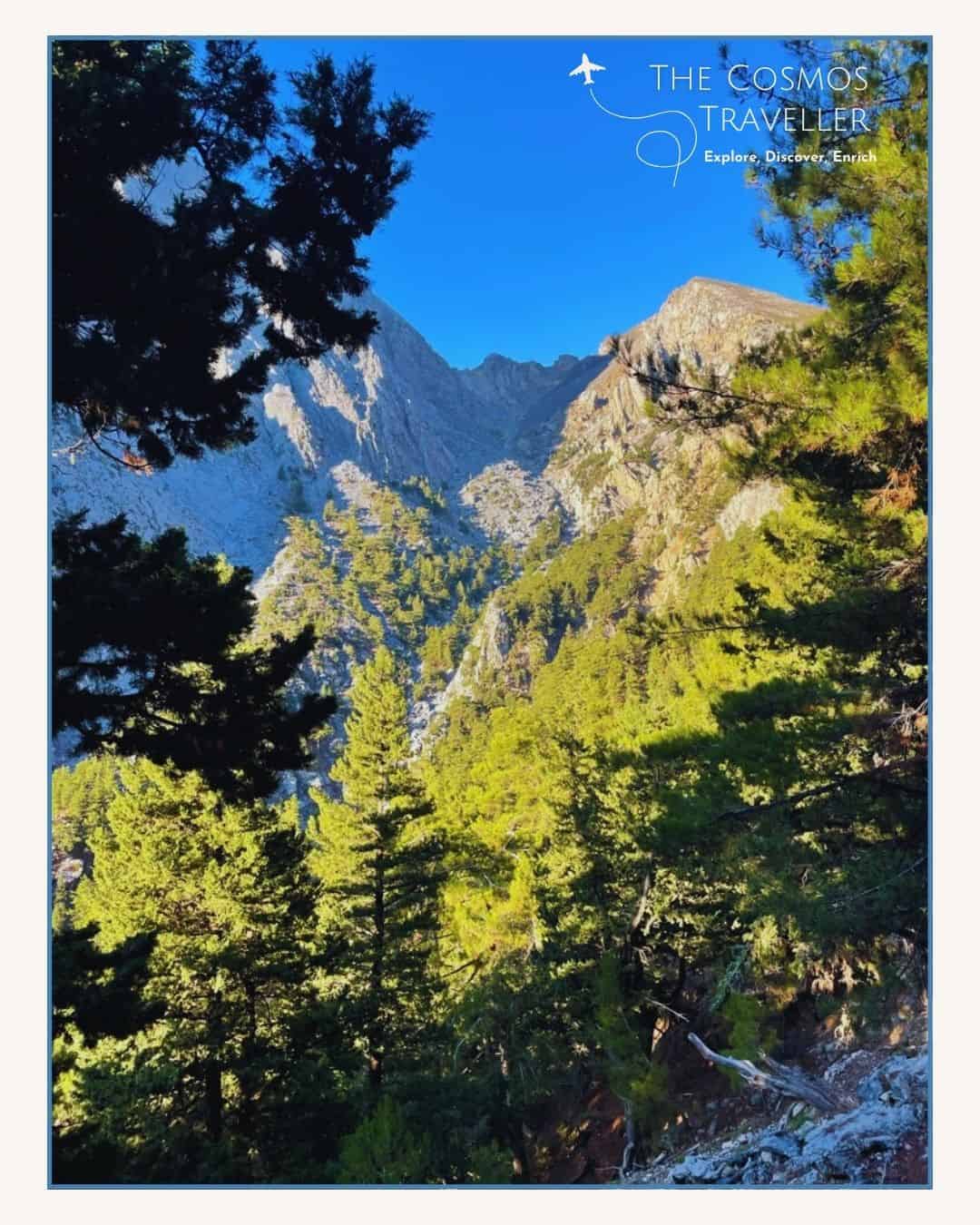
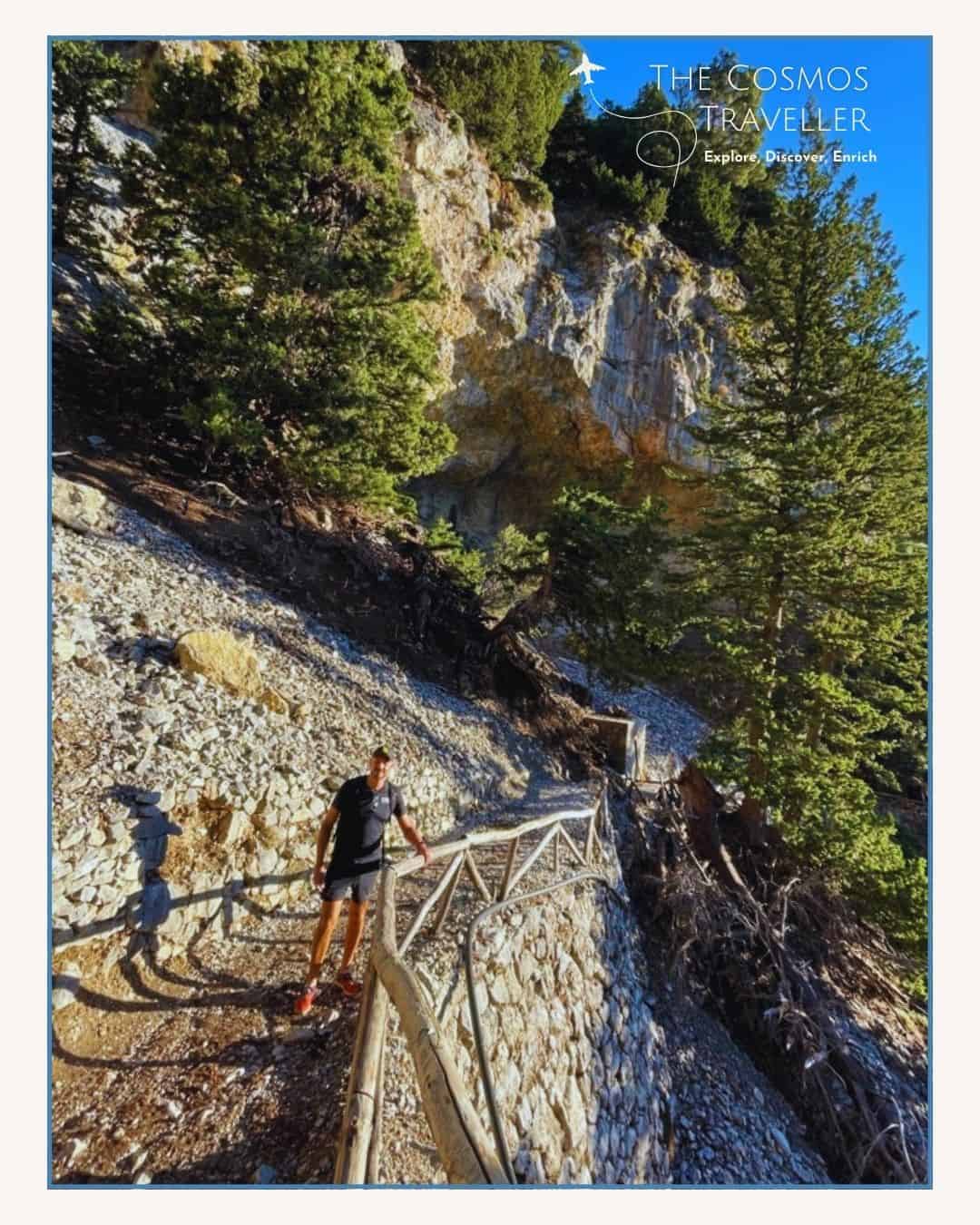
Toward the end of this stretch, you’ll start to cross the riverbed several times. Whether there’s water or not depends on the season—when I visited in June 2025, it was flowing gently, bringing welcome shade and a bit of breeze.
At around the 3.8 km mark, you’ll reach Agios Nikolaos, the first major rest stop. Here you’ll find toilets, fresh water, benches, and a park ranger post.
🌲 Fun Fact: This shady rest area was once the site of a temple dedicated to Apollo. While nothing remains of the ancient structure, the soaring cypress trees here are said to be the tallest in Crete—and it definitely feels like a sacred pause point.
📍 Stage 2: Through the Forest (Agios Nikolaos to Samaria)
🗺️ Distance: ~3.7 km
📉 Elevation loss: ~200 meters
💧 Water Stations: 2
This section is much gentler than Stage 1, but still involves a steady downhill walk through shaded forest paths and softer terrain underfoot. It’s often considered the most peaceful part of the Samaria Gorge hike, where you can truly tune into the natural beauty around you.
From Agios Nikolaos, the trail crosses the dry riverbed several times. There are a few mild ascents where the path climbs above the gorge, offering elevated views over the rocky bends below—but nothing too strenuous.
📸 Photo Tip: There are some fantastic photo spots along this stretch, especially if you’re happy to climb a boulder or two for that perfect Instagram-worthy shot.
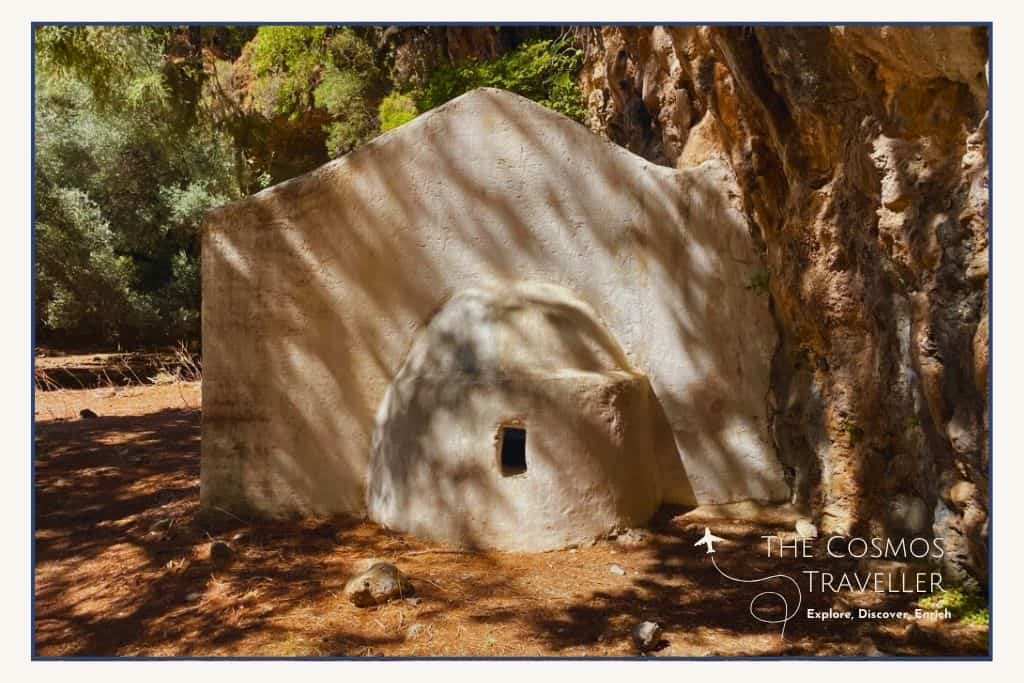
You’ll find a small rest stop about 1 km before you reach Samaria Village, but I’d recommend pushing on to the main stop. The abandoned village of Samaria is roughly the halfway point of the hike and makes a great place to recharge.
To reach it, cross the wooden bridge on your left. There you’ll find toilets, water fountains, plenty of shade, and benches to sit and take a proper break.
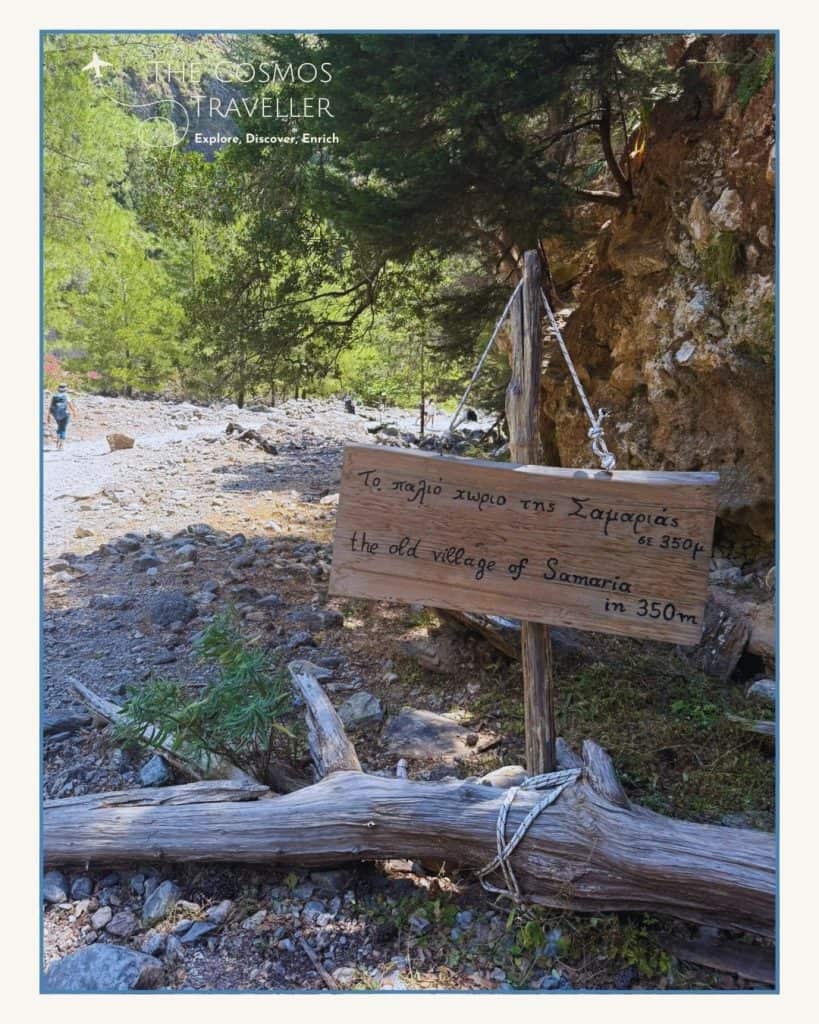
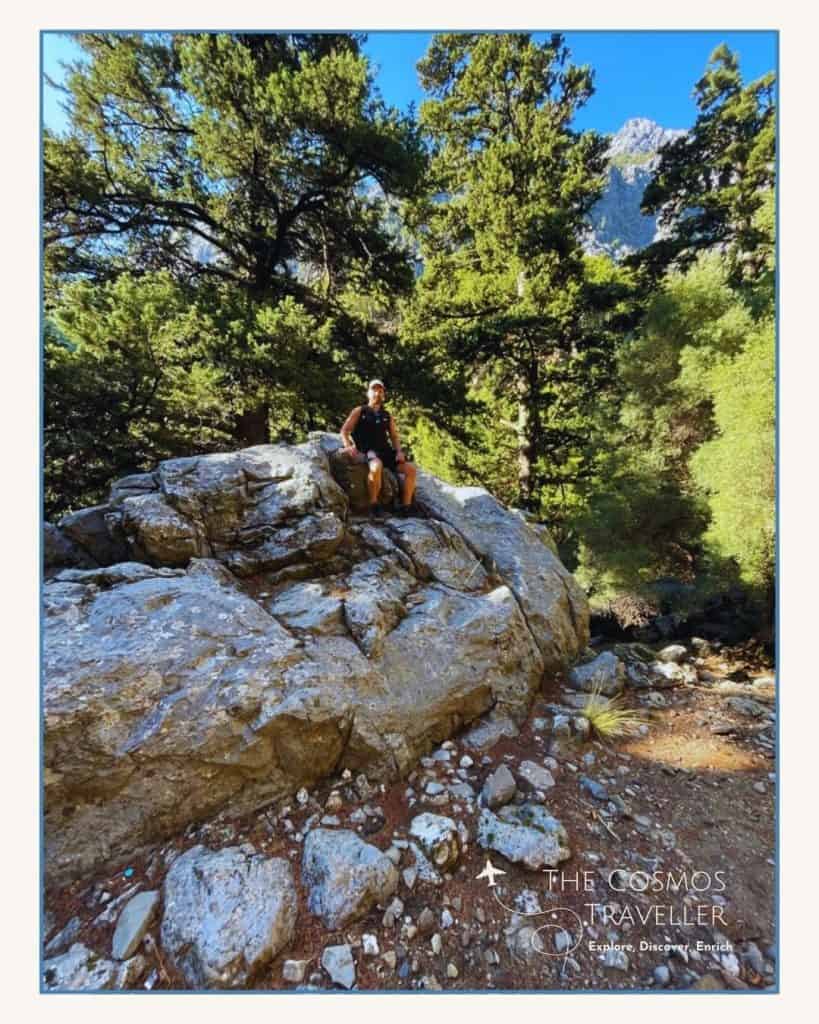
🏚️ Fun Fact: The village of Samaria was inhabited until 1962, when the National Park was established and residents were required to relocate. Due to its remote location, the village was nearly inaccessible in winter, making year-round life especially challenging.
📍 Stage 3: The Gorge – Samaria Village to Christos Rest Stop
🗺️ Distance: ~3.2 km
📉 Elevation drop: ~200 meters
💧 Water Stops: 1 (at the Christos rest stop—so make sure you’re topped up before this stretch)
To continue your hike, cross back over the wooden bridge and turn left to rejoin the main path. From here, you’ll pass more scattered remains of the abandoned Samaria village, with stone ruins peeking out between the trees.
After about 30 minutes, you’ll begin walking directly in the riverbed, where the gorge starts to narrow dramatically—this is the part that gives Samaria its epic reputation for spectacular scenery.
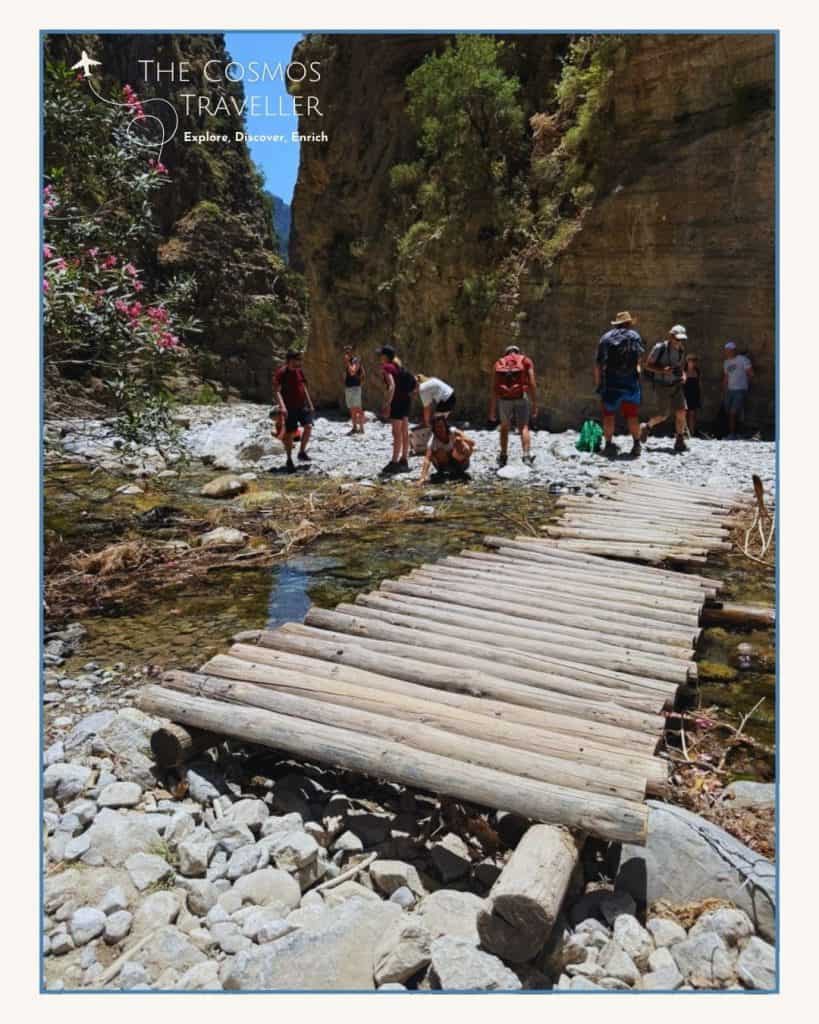
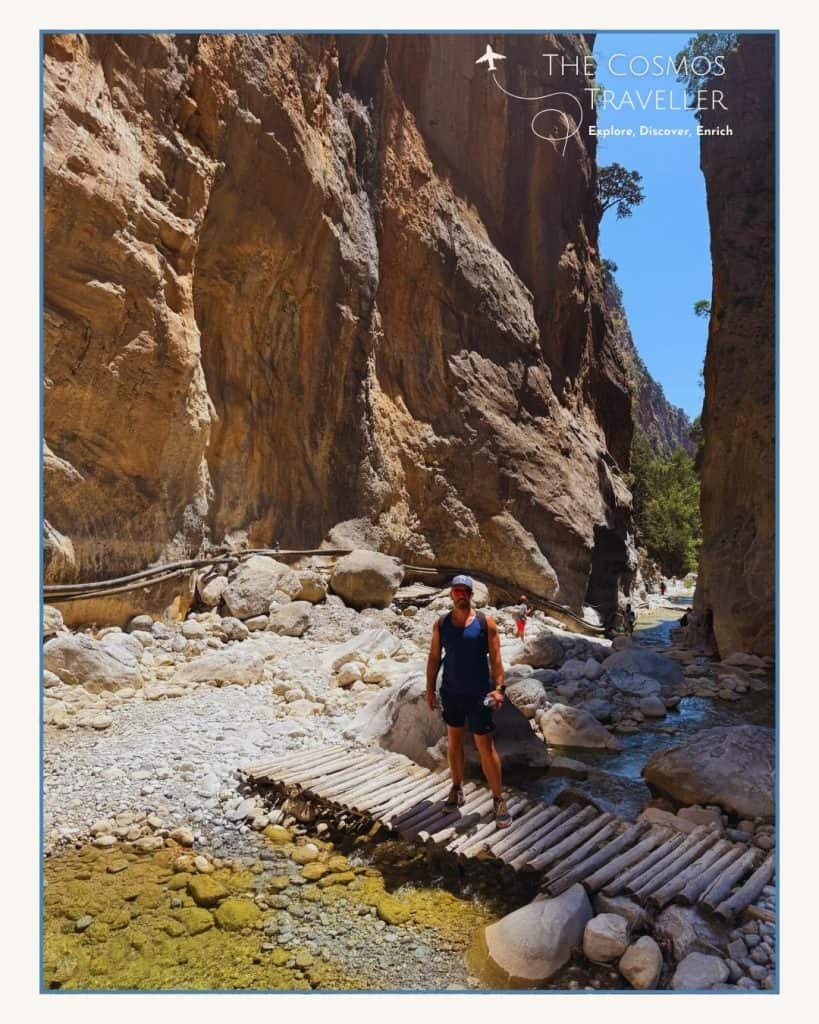
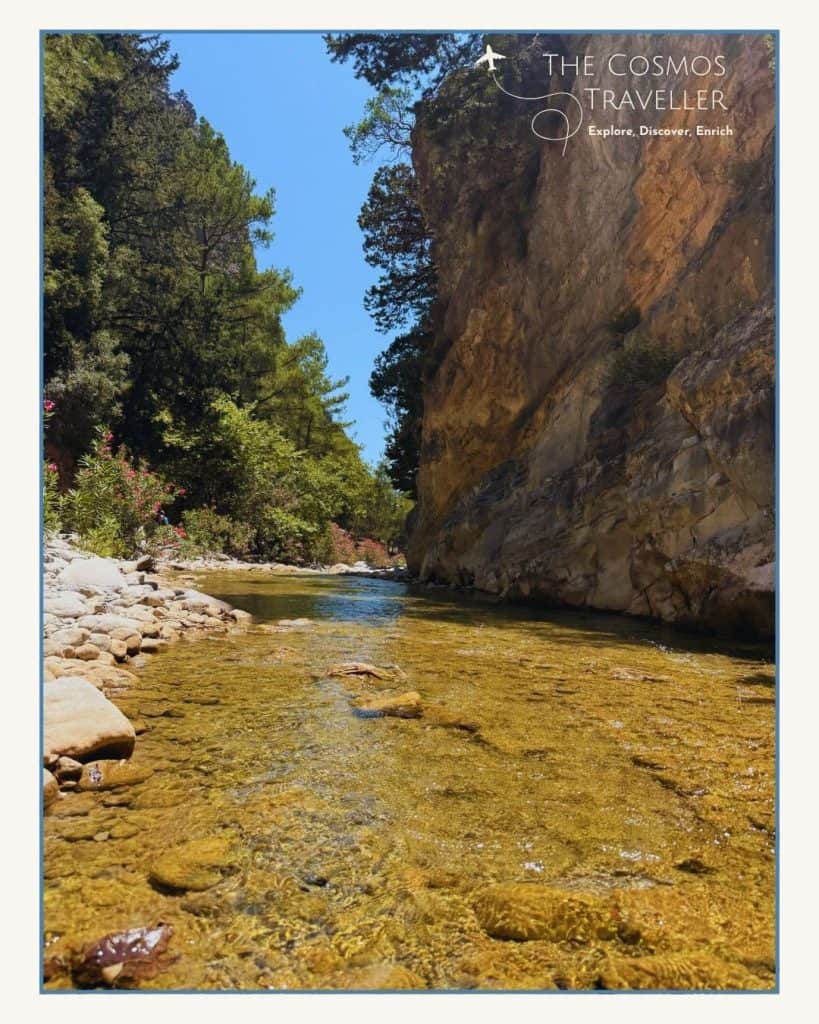
⚠️ Safety Note: Falling rocks from 500m above are a real risk here, especially in windy weather or after rain. To stay safe, keep a steady pace through the narrower sections and avoid stopping beneath steep cliffs for rests or photo breaks.
Over the next few kilometres, the trail winds through the riverbed, with some makeshift wooden bridges helping you cross the stream. The uneven, stony path can be tough on the feet, so take care with your footing.
💡 Top Tip: Only stop for a break in open areas away from the cliff walls, and drink plenty of water—this stretch can feel surprisingly long and exposed.
The towering rock walls are breathtaking here, and you’ll have plenty of chances for stunning photos of the gorge in its most dramatic form.
At around the 11 km mark, you’ll reach the shaded Christos rest stop. This is your last chance to refill water before the final stretch to Agia Roumeli at the southern exit of the gorge.
📍 Stage 4: The Finish Line (Christos to Agia Roumeli)
🗺️ Distance: ~3.5 km
📉 Elevation drop: ~260 meters
💧 Water Stops: 1 (at the exit of the National Park—also a great place to grab a cold beer or fresh orange juice!)
After leaving the Christos rest stop, you’ll soon reach one of the most iconic highlights of the entire hike: the Iron Gates. This is the narrowest point of the Samaria Gorge—just 3 meters wide, with towering rock walls soaring 300 to 500 meters above you. It’s dramatic, humbling, and totally unforgettable.
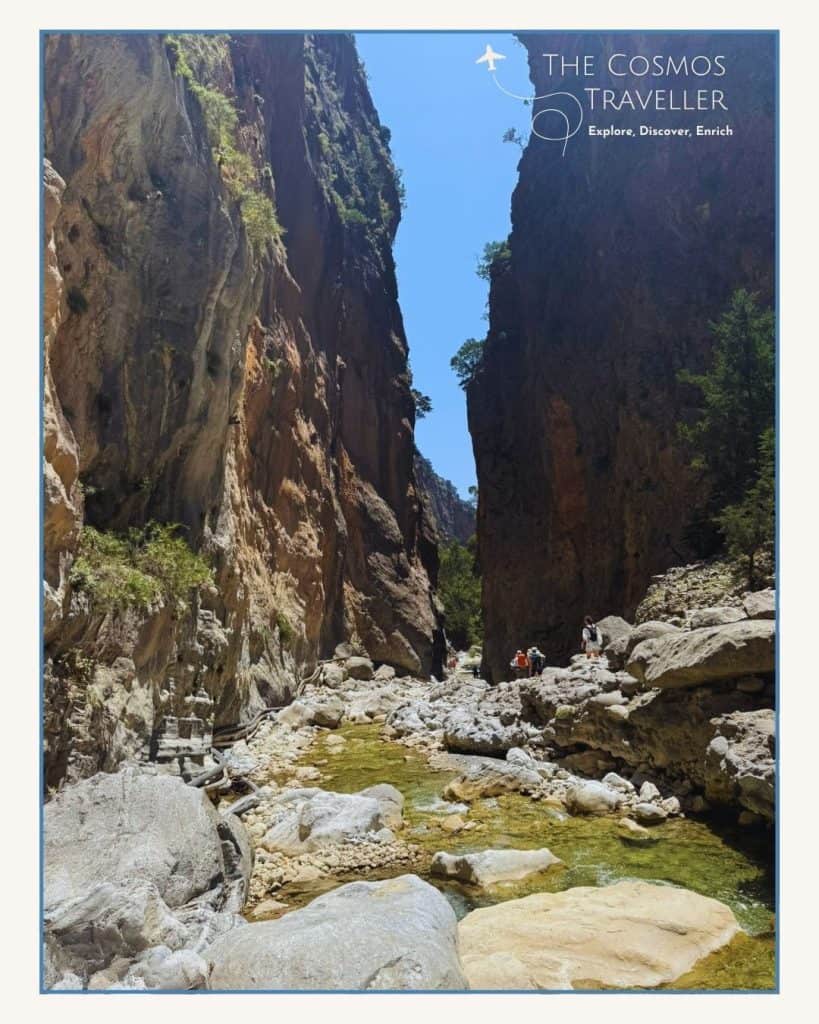
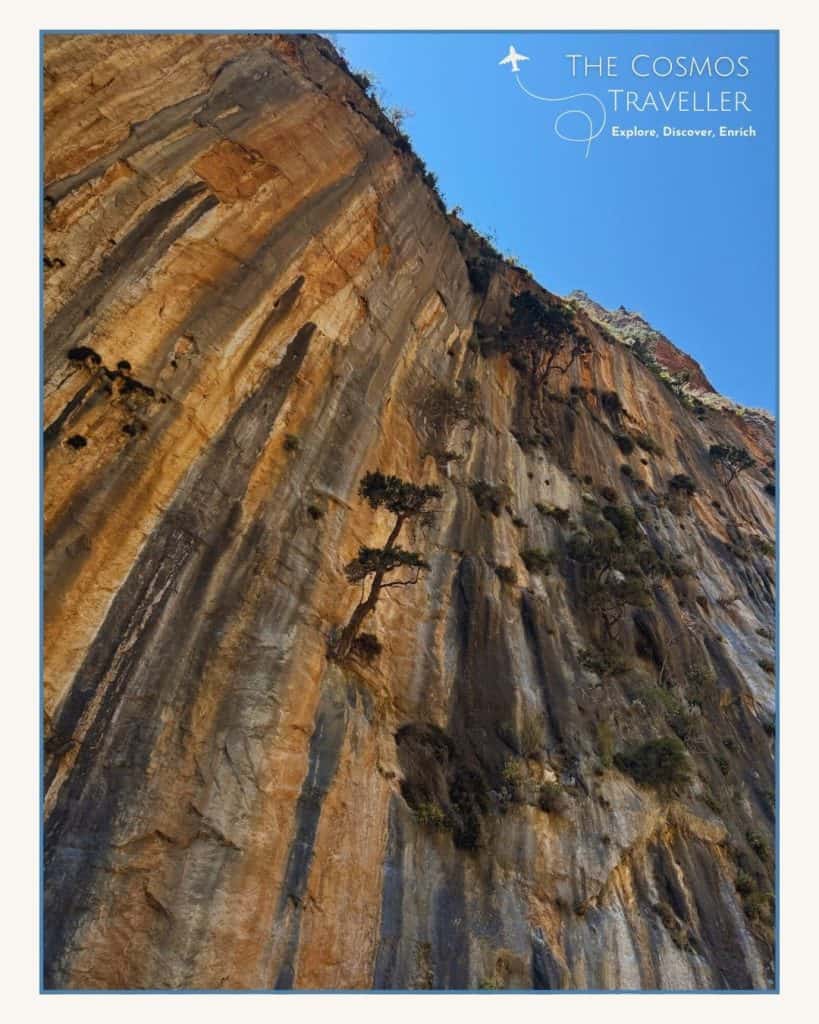
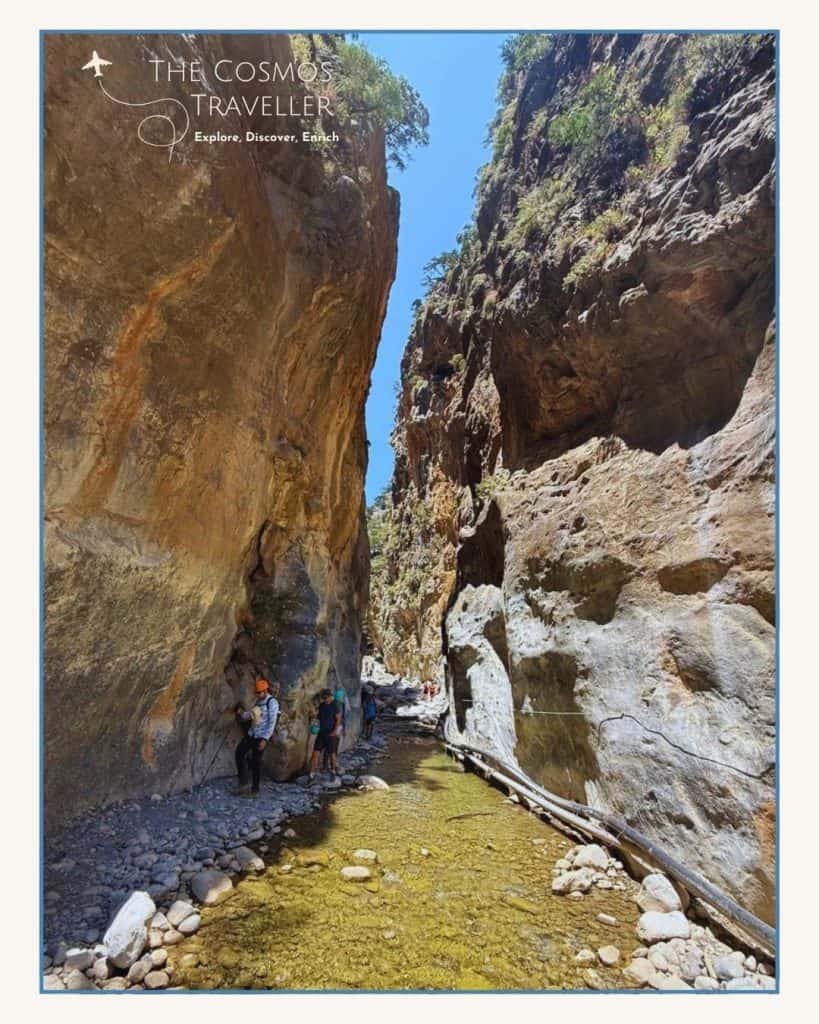
It’s easy to imagine winter torrents of water thundering through here, isolating the now-abandoned village of Samaria from the coast at Agia Roumeli.
Expect a bit of a bottleneck here—some visitors hike up from Agia Roumeli just to see the Iron Gates and snap a photo. Be patient. Everyone’s after that shot, and it’s worth the wait.
Once you pass through, the gorge widens again, and the trail becomes a bit easier underfoot.
After about 2 km, you’ll reach the official exit of the National Park. Don’t forget—you’ll need to show your ticket here so rangers can account for all hikers.
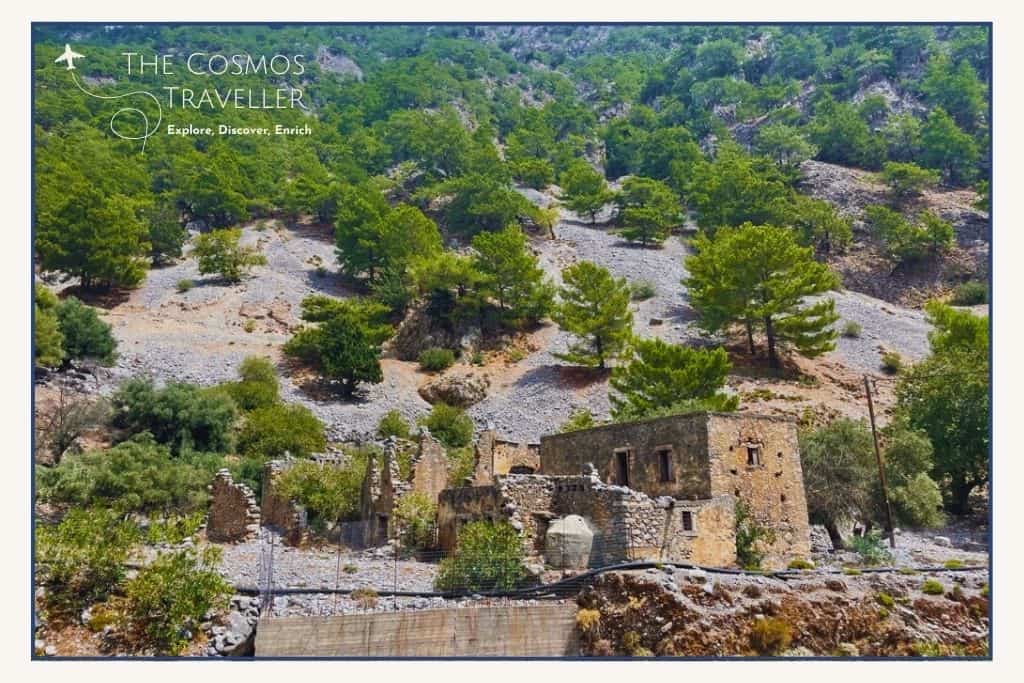
There’s a small refreshment stand here where you can buy a cold drink or juice. It’s a good spot to rest your legs—but don’t get too comfy, you’ve still got about 1.5 km to go before you reach the sea, restaurants, and ferry port.
🏚️ Did You Know? As you exit the park, you’ll pass through the remains of old Agia Roumeli, a village destroyed by a massive flood in the 1950s. The newer part of the village now sits right on the coast.
🚌 Optional Shortcut: A local bus (€2) runs from the exit gate to the waterfront. But if you can, I recommend walking the last stretch. It’s a solid gravel road, not too difficult, and finishing on foot means you’ve truly completed the entire route from Xyloskalo to Agia Roumeli.
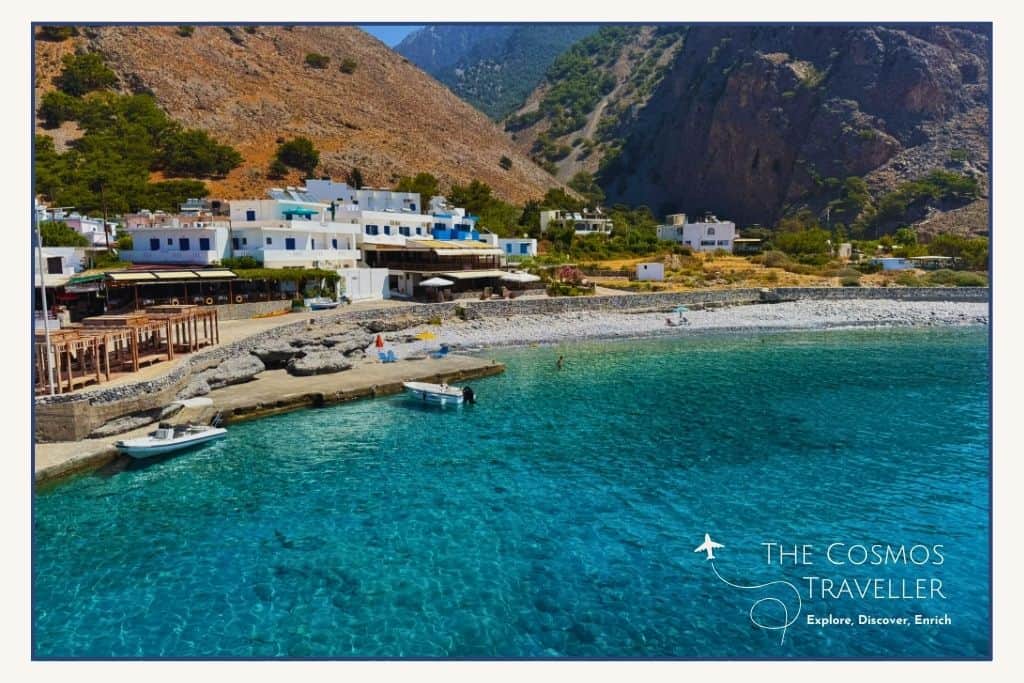
🌊 Awaiting you at the coast? Cool waters, a beach with some of the clearest blue sea in Crete, and the unbeatable feeling of having conquered one of Europe’s most spectacular gorges.
💡 Honest Tips for Hiking the Samaria Gorge in 2025
Here’s what I think you really need to know before hiking the Samaria Gorge. These aren’t secrets—just practical advice from someone who’s done it three times.
🕕 Start Early – Really Early
Be on the trail by 7:00am, when it opens, if you can. Not only will you avoid the biggest crowds, but you’ll also catch the cooler morning temperatures during the steepest descents. Plus, the light in the upper gorge is magical at this hour.
In 2025, I started at 9:15am, compared to 7:00am in 2022—and trust me, it was much hotter toward the end and much busier at the beginning.
🚢 Book All Your Transport in Advance
Don’t leave your logistics to chance. Book:
- Your ferry from Agia Roumeli (check Anendyk’s website) the night before. You can buy it when you arrive, but I like having it sorted ahead of time.
- Your taxi or bus back from the ferry arrival point to your accommodation.
- And if staying in Omalos, confirm transport to the trailhead with your hotel.
It’s a long day, and the last thing you want is stress about missing your ride.
🧘 Rest Where the Groups Don’t
Skip the obvious rest stops if they’re crowded. Just 200m beyond most of them, you’ll often find quieter places by the river—perfect for a peaceful snack or photo break. Just be sure to avoid stopping beneath steep cliffs, as falling rocks are a real hazard.
🥾 It’s Not a Walk in the Park
Yes, it’s one of the most stunning hikes in Europe—but it’s also physically demanding. The rocky terrain, constant downhill, and summer heat can catch people off guard.
That said, my 77-year-old father completed it with me in June 2025—so age isn’t everything! Just come prepared: wear good hiking shoes, carry plenty of water, and know your limits.
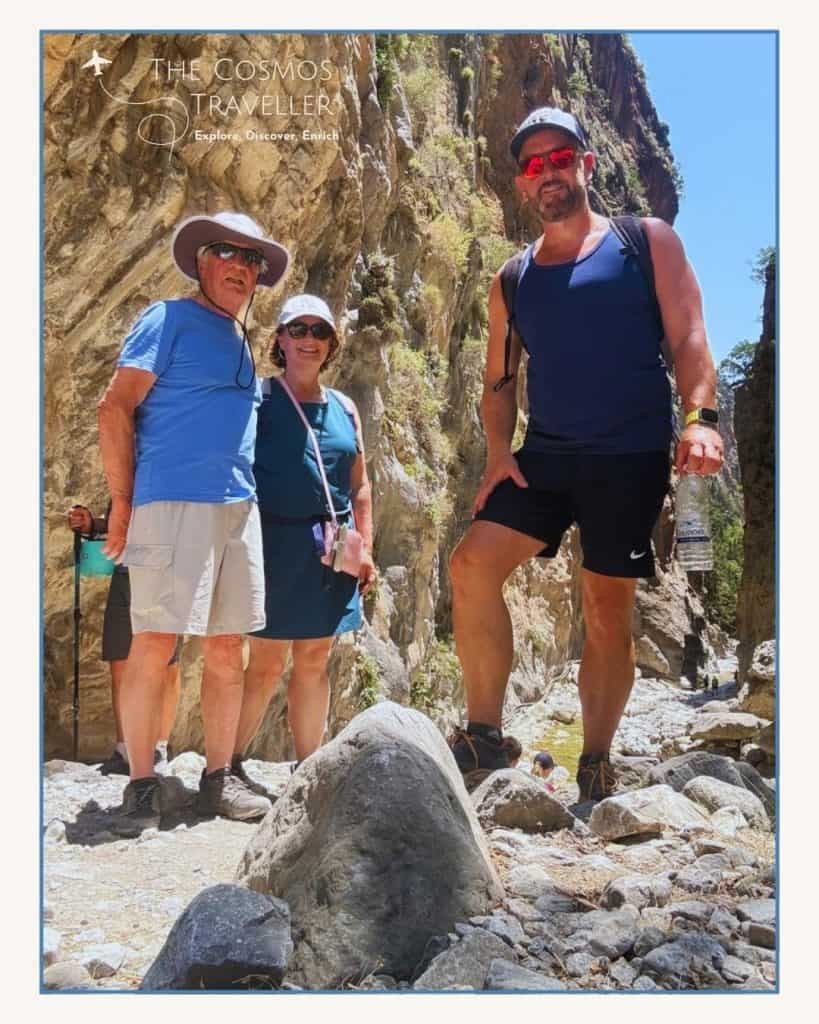
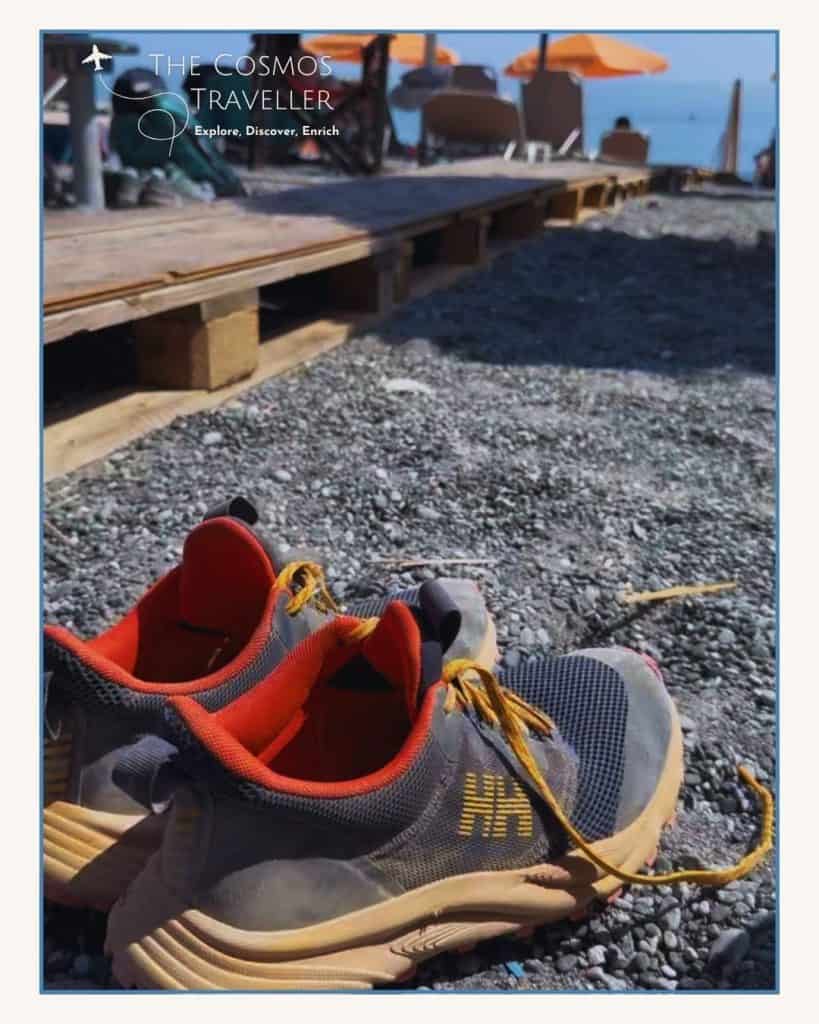
✨ Bonus Tips You Actually Need
- Toilets are available at all major rest stops—but bring your own tissue and hand sanitiser.
- Swimming at the finish is the perfect way to soothe sore feet—pack a swimsuit in your day bag.
- Cash or card? Most places in Agia Roumeli accept cards, but carry some cash for snacks or the €2 bus.
- Bug spray is useful for shaded rest areas.
- ⛑️ Carry a First Aid Kit with plenty of plasters in case of blisters.
- No phone signal inside the gorge—tell someone your plans before you set off.
🏖️ Top Tip for the Beach Finish
Many of the beachfront cafés in Agia Roumeli rent sunbeds and umbrellas for around €5, which often includes a drink (yes, even a beer!). It’s a fantastic option to relax after the hike, especially since the sand can get incredibly hot.
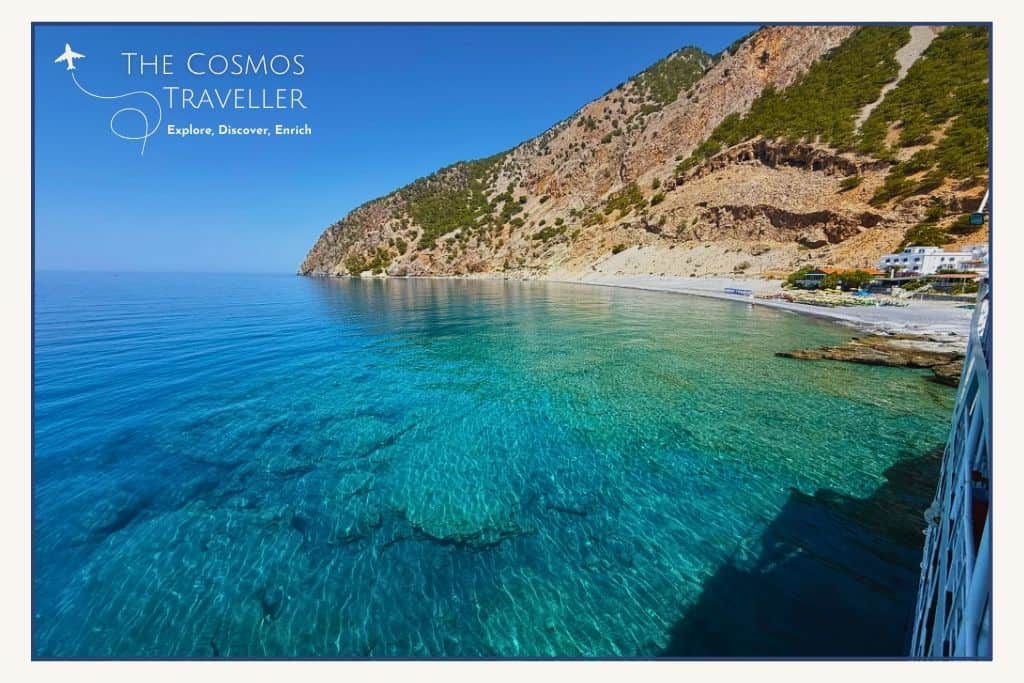
💡 Top Tip – I recommend packing a pair of lightweight beach shoes or sandals in your bag—your feet will thank you.
FAQs – From My 35 Years of Blisters
❓Is the Samaria Gorge safe for kids?
My 11-year-old self survived, but if you’re asking me now – I’d say 14+ unless your kids are experienced hikers. The heat, rocky terrain and sheer length can be a lot for little legs.
❓ Can you still find solitude?
Yes – but only just. Try a weekday in mid-October or early May when the crowds are thinner. Just be aware that the ferries stop running later in the season, so check in advance that you can get out from Agia Roumeli. Otherwise it’s 18km back uphill!
❓Samaria vs Imbros Gorge – which is better?
- Samaria = bragging rights, drama and scale
- Imbros = shorter, easier and more enjoyable for most people today. Last year (2024) I actually hiked this down and back up and did not find it challenging.
If you’re fit and craving a challenge, Samaria is definitely worth it. If you’re hungover and wearing Converse, pick Imbros.
❓ How long does it take to hike the Samaria Gorge?
Plan for 4-7 hours depending on your pace, photo stops and fitness level. I’ve done it in under 5, but also taken over 7 hours with a partner who wanted to look at and photograph every rock.
❓ What should I pack for hiking the Samaria Gorge?
🥾 Grippy Hiking/Trail Shoes
💧 Water bottle (you can refill at the springs)
👙 Swimsuit & Towel for the beach at Agia Roumeli
⛑️ First Aid Kit with plasters
🧴 Sunscreen & insect spray
💰 Cash for snack or the €2 bus ride
👣 Optional but practical: trekking poles and beach shoes (the sand at the beach is scorching!)
❓ Can I hike the Samaria Gorge solo?
Yes and plenty of people do – but be prepared. There is no phone signal in the gorge and make sure that you tell an emergency contact your plans, check ferry times and don’t stray off the path. The route is well-marked and patrolled, so solo hiking is safe if you’re sensible.
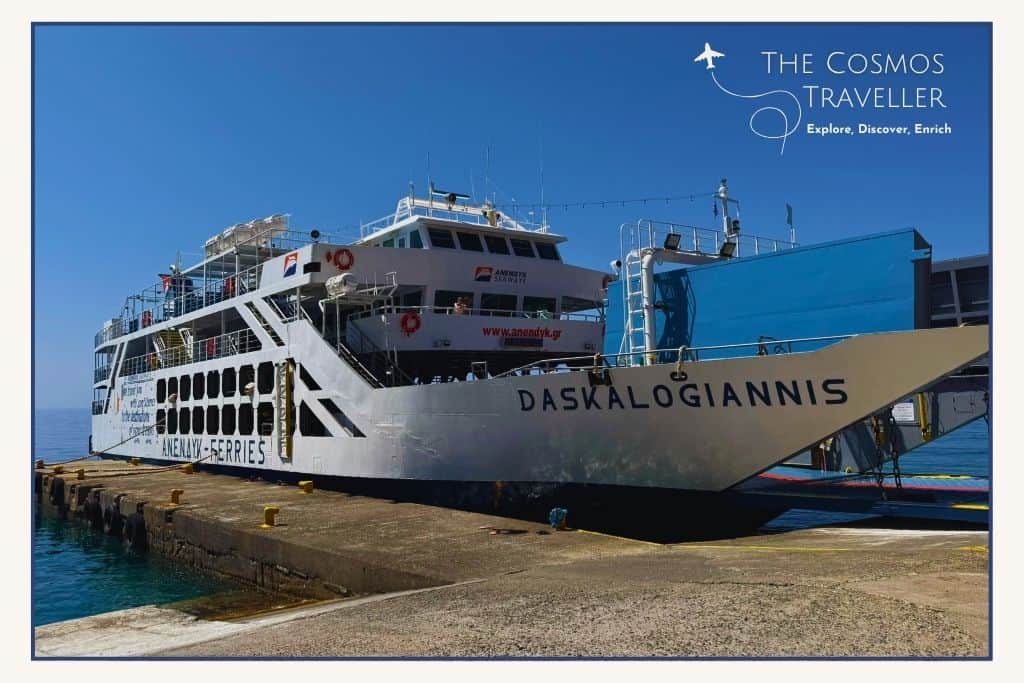
Final Verdict: Is Hiking the Samaria Gorge worth it?
Having hiked the Samaria Gorge three times over nearly 40 years — from seeing people in flip-flops in 1988 to high-tech trail shoes in 2025 — my answer is a firm yes… with a few caveats.
If you’re after a gentle stroll, this isn’t it. The Samaria Gorge is long, hot, and rugged. Your knees will ache. Your feet will protest. You’ll sweat. But you’ll also pass through jaw-dropping landscapes, walk in the footsteps of ancient pilgrims, and finish at one of the most beautiful coastlines in Europe.
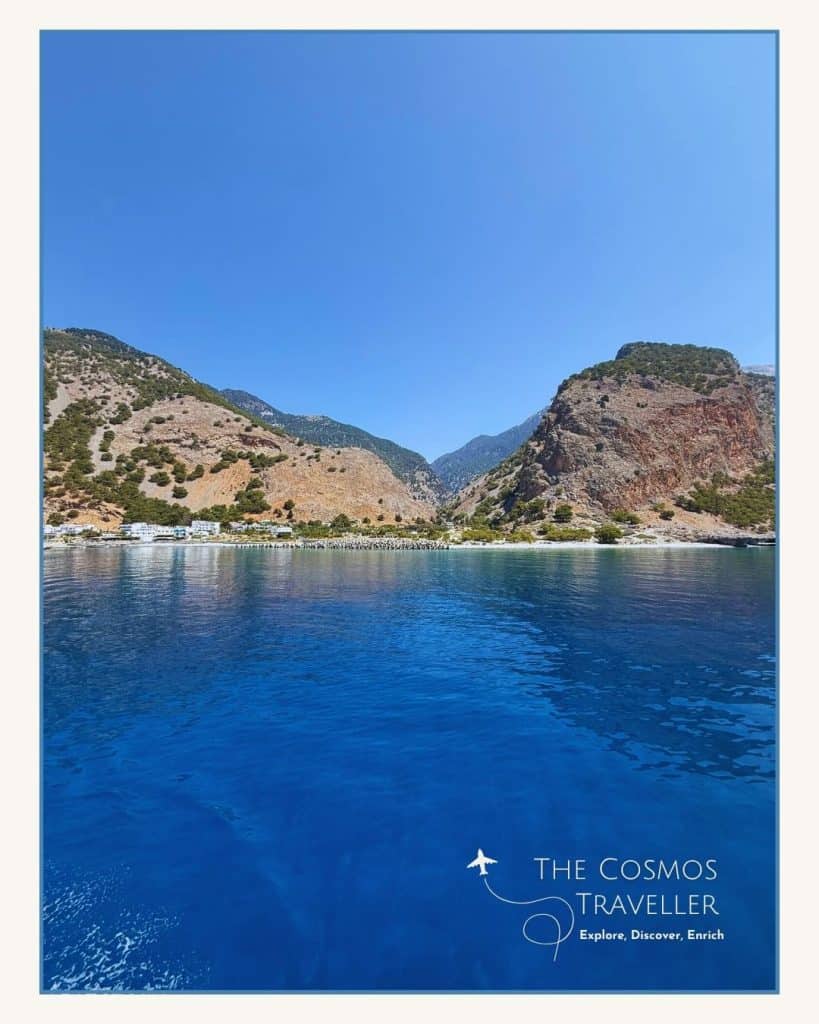
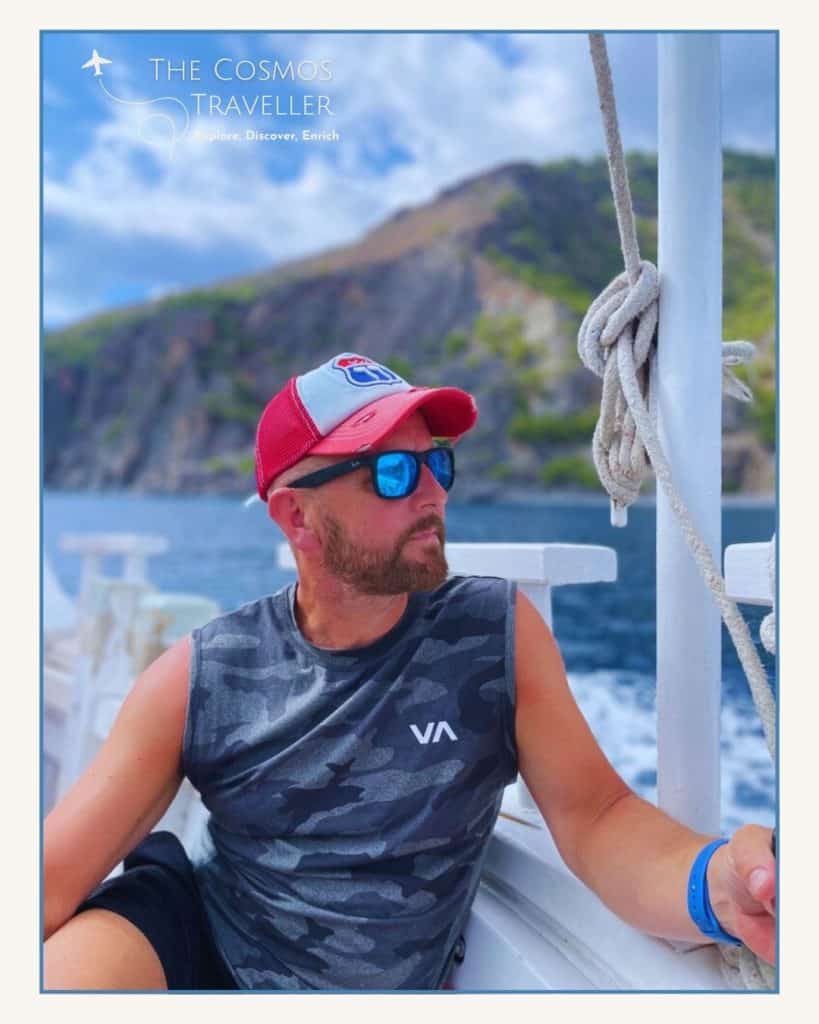
For me, what makes it truly worth it isn’t just the cliffs or the goats or the Iron Gates — it’s the sense of achievement at the end. That deep breath as you step into the sea at Agia Roumeli, knowing you’ve earned it the hard way.
So — is hiking the Samaria Gorge worth it?
If you’re reasonably fit, curious, and up for a challenge: absolutely. It’s a bucket-list experience that leaves you tired, exhilarated, and already planning your next Greek island hike (I am already planning on doing it again next year in 2026!)
👇🏽 Save this guide, share it with your travel companions, and don’t forget to pin, post, or message it to yourself for later

Written by Richard Hoskisson
Founder of The Cosmos Traveller
With over 30 years of travel experience across France, South Africa, the UAE and Greece – and many more far flung places – Richard helps curious travellers explore hidden gems, discover culturally-rich adventures and enrich their travel stories.
Published June 2025
